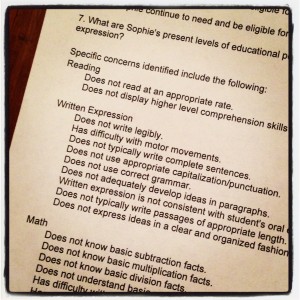
Taking “Individualized” Out of the IEP — and Inaccurately Labeling My Kid as Physically Aggressive
posted Thursday February 13th, 2014
I’d known for weeks that I had to attend a meeting to discuss Sophie’s future — but I couldn’t bring myself to open the envelope from the psychologist till I was in the car, headed for the school.
I knew what was inside: All of the testing that has been done on Sophie over the last six years, the standardized tests, the “special” testing and one behavioral analysis after another.
Testing happens all the time, but every three years the law requires a formal re-evaluation for a kid with an IEP, an Individualized Education Plan. Three years ago, as you might recall (because I wrote about it ad naseum at the time and ever since) Sophie didn’t test so well and the school psychologist and I got into it at a meeting and she wound up announcing that Sophie has the “cognitive abilities of a 3 year old” — a line that rings in my head to this day, and probably always will.
So I wasn’t so keen on attending this meeting, and at the same time, I couldn’t wait. New test results! A chance at redemption, even though that psychologist packed her bags and moved on to terrorize kids and parents at another school. Still, I’d know the truth.
Sophie’s lawyer had other plans. “Don’t test her,” she said. “Sophie’s not a set of numbers. There’s more than enough data out there already to demonstrate what she needs moving forward in school.”
Plus, she added, what if she just doesn’t test well? Then there’d be more bad test results on the books — and they’d be more recent.
I agreed. So when I opened that envelope on the way to school, I skimmed it briefly, wincing (see above) but not seeing anything I didn’t already suspect. Of course, the truth is that while I’m an educated adult who regularly reads lots of detailed documents with a critical eye, when I look at something regarding Sophie it tends to morph into a foreign language. Thank goodness for that lawyer. (Seriously. I have her number if you need it.)
“Oh, we need to take all this out,” the lawyer said as soon as the meeting began. Specifically, she was referring to a list of behaviors a few pages in:
*Interactions with other students are inappropriate.
*Is verbally or physically aggressive.
*Is impulsive.
“Wait, what does that say?” I sputtered. “Sophie is physically aggressive? I’ve never heard that bef–”
“Don’t worry about it, all that’s off the report,” the lawyer interrupted, shooting me a look.
The meeting continued — everyone from the principal to the therapists to Sophie’s teacher and aide weighed in on how well she’s doing, where her challenges are, and what she’ll need moving forward; everyone agreed no more testing is needed.
But I couldn’t stop thinking about that now-deleted section — Is verbally or physically aggressive. What was going on? What were they not telling me?
Finally it was my turn to speak again.
“Look,” I said. “I know you all know I tend to beat a dead horse. But I’ve got to know how this happened.”
The new psychologist explained that the teacher had filled out a questionnaire; based on her answers, the psychologist (who I’m pretty sure has never met Sophie — definitely hasn’t interacted much with her) checked certain boxes on an automated computer program that spit out the list of things Sophie could and couldn’t do.
I looked at the list again. Most of it was inaccurate. At best, it told an incomplete story.
“Please be honest,” I said to the teacher and the aide. “Have you known Sophie to be verbally or physically aggressive?”
“NO!” they both insisted. (I asked several more times; they continued to insist no. For that matter, no one ever explained — in the report or in person — how Sophie interacts inappropriately with others or is impulsive, though it’s not a stretch to imagine both. Still, it’s not documented.)
The psychologist directed us to the interview with the teacher, which was included in the report:
General Education teacher stated that Sophie completes classroom work, completes homework, attends to classroom instruction/teacher directions, comes to class with necessary materials, appears to be organized, completes tasks in allotted time, changes to new tasks appropriately, works independently, seeks clarification appropriately when needed, completes work with reasonable accuracy/correctness, enters/exits classroom appropriately, and demonstrates appropriate level of motor activity. Skills reported as lacking are performs adequately on daily quizzes, and performs adequately on major tests.
Sophie is a student in my 5th grade class. She is an extremely confident individual. Her strengths include being very social and artistically inclined. In the classroom we have been working on entering and leaving the classroom appropriately, staying in her seat and being organized and able to get out what she needs to learn. She frequently needs one on one directions and simple reminders to accomplish a task. She has many friends and loves school. She is an important part of our class.
I’m still not sure how that translates to “Is verbally or physically aggressive.” I’ve gone over the 20 page report several times and found no mention of either. (Though it is true that Sophie was in trouble earlier this month for telling a friend she can’t come to her birthday party. That’s not on the report but it did happen.)
In the end, the entire team handed back their copies of the report and the district’s special education director (who attends these meetings — with her own lawyer — because I bring a lawyer) offered to shred all of them.
“Good,” I said, holding onto mine, then asking for more details.
Turns out, Tempe Elementary District — along with several others in metro Phoenix and probably lots all over the country — uses an automated program to complete IEPs called Synergy Special Education, produced by a company called Edupoint. (You can visit their website at edupoint.com.) If a district doesn’t use Edupoint, chances are they use another automated software system.
According the company’s site, the software makes the IEP process 80% faster! “Synergy SE’s robust collaborative environment and customized workflow streamline special education processes, increasing staff efficiency and ensuring compliance to meet state and federal regulations.”
That’s nice. But what if you haven’t happened to hire a lawyer who fine-tooth-combed your kid’s report and knew enough to question it? It’s my fault for not seeing it on there, but even if I had, for as bitchy as I can get in a meeting, it wouldn’t occurred to me to ask to have it removed; I wouldn’t have though that possible — no one acts like it is. They just keep handing you papers to sign and looking at the clock to hustle things along.
Sophie has enough challenges ahead of her in junior high without her new team seeing “Is verbally or physically aggressive” on a report. And even if a kid were to be verbally or physically aggressive, why on earth would you list those two in the same category?
I’m not sure why any of this surprises me anymore. Somehow I don’t think this is what the lawmakers who passed the federal IDEA intended. Or what anyone intended, really.








Oh boy does this hit home for me navigating the State’s mental health system with my brother- how vulnerable people are marginalized to numbers or worse yet, targets. I’m just thankful we both have good attorneys but I’m with you- navigating thoughts of all those who don’t have advocacy like that…or at all. I’m glad you’re writing about it.
WTF!!! Automated IEPS……………………………….I’m gonna scream!!!!!!!!!!! How does one find out if thier state or district does this… and cold it possibly be legal???
I learned alot- reading this. And this is going into my questioning file- what system gerates the IEPs and the phrase-”I’d like that removed.” They have their tricks- and we have ours. Blech.
First: I’ve never met a school psychologist I liked. Including my father-in-law.
We are currently dealing with a possible label of “agression” for Finn at school. He’s 5, in TK, and I’ve been called into two informal meetings with his teacher to discuss Finn pushing another child. Everything that’s been described to me about it seems like pretty typical 5-year old playground behavior, but because it’s Finn, it’s this ISSUE. I’ve been advised to have a Functional Behavior Assessment done because of his “agressive” behavior (even though his teacher and aide both agree that they don’t believe he’s actually being malicious when he’s pushed – it’s more like a playful nudge). Yeah, one more assessment in his file, one more label in his file. Just what I want.
Verbally and physically aggressive in the same category? Because America. At some point we became afraid of the expression of anger (with language, and in other non-physically-harmful ways) and began to define it as violence. Emotional and psychological abuse do exist, but, for example, threats are often illegal, while an isolated episode of yelling non-threatening content in front of other people because you’re upset or frightened is sometimes perfectly okay, but institutions are so liability-averse they’ve instituted zero-tolerance policies.
So enlightening. Thank you for sharing. It may be time I hire that Edu advocate my friend recommends. Despite an undergrad in psy, I’m just not well enough equipped to navigate this deceptive system.